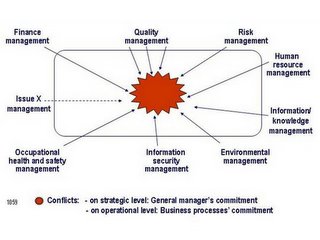Quality concept covers all the aspects in any organization’s products and activities that are significant from the organization’s business point of view. Similarly also quality management (i.e. quality of management) includes all the responsibilities and activities of an organization’s management and leadership, e.g. managing
- finances
- product quality
- business risks and business continuity
- human resource development
- knowledge and competences
- business information and information security
- occupational health and safety factors
- corporate security
- environmental protection
- social responsibility
- business communications
- technology
- innovations
- ethics
Also related ISO 9000 standards (especially ISO 9004) give guidance and models for general principles and practices for all managing responsibilities. However, within various above mentioned specialized areas of management there may be very differently established management practices. For instance, in the area of financial management the last decades have seen a development of widely adopted de facto principles and practices, such as budgeting and accounting practices. Additionally, there are many internationally recognized and accepted standards for the different specialized management areas.

If there are within an organization distinct and different management approaches sponsored by different experts, this will sooner or later generally entail negative effects to the whole. In this connection it is common that one hears talk about such-and-such a system, for example of a quality system or an information security system. In order to avoid negative effects, it would be better to talk rather about the “systematicity” (systematic approach) instead of a system. In this case “systematicity” would refer to including the "flavor" of that special expertise in actual business management practices.
If distinct management areas are allowed to become overly emphasized due to their independence and distinctness, a common consequence of this is also conflicts occurring between these different areas, for instance in connection with prioritizing and realizing various initiatives and projects. Such conflicts concern especially two management levels of an organization:
- The CEO, because his or her commitment in all areas is desired
- Business processes, because everyone wants to make an impact and be effectively taken into account in key business process operations
A futile competitive situation between different doctrines can be avoided only if an organization has a sufficiently solid leadership system of its own, one which enables it to utilize all those doctrines which have proved to be useful, based on its own deliberations.
The reason why the broad quality integration has often not taken place effectively could be the fact that a company's own leadership system has not yet taken shape to a sufficient degree, resulting in the lack of points to "grasp onto". It might also be the case that specialized management issues are delegated too broadly to experts, who will then create their own special systems, even by emphasizing their own position. Moreover, very often many concepts and basic principles of different expertise are foreign to business managers.





